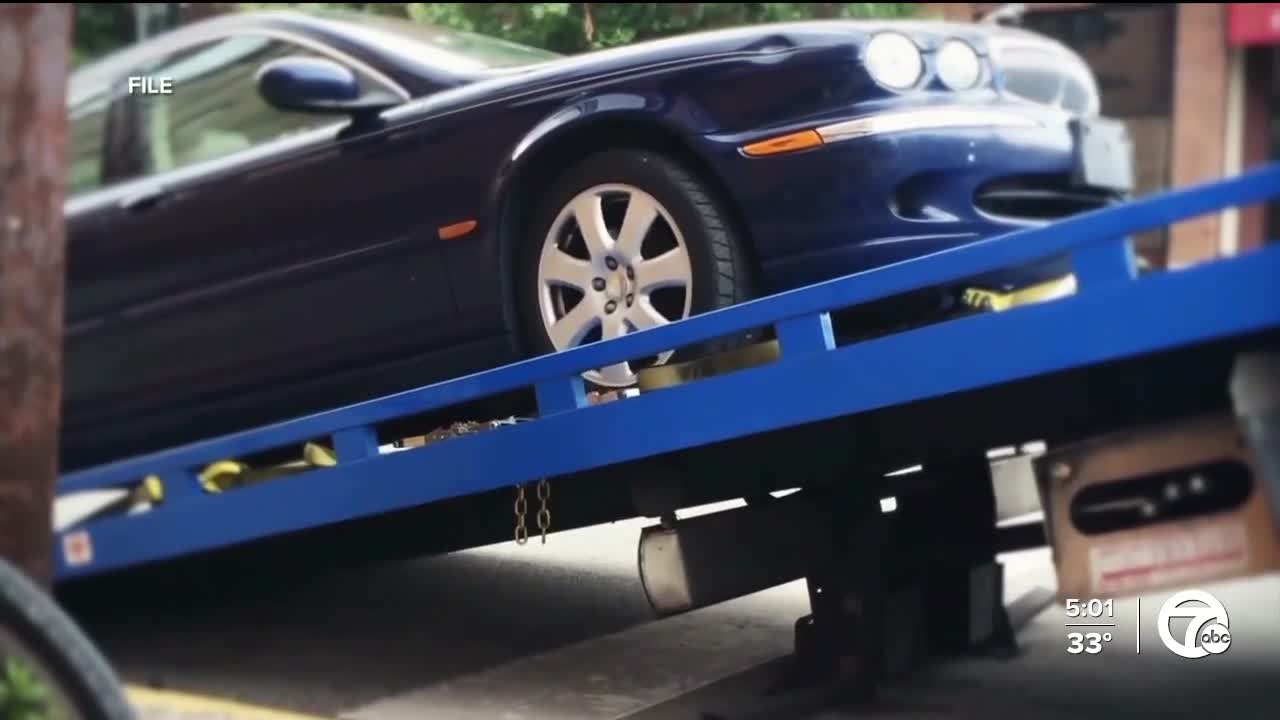DETROIT (WXYZ) — The city of Detroit unveiled a revamped towing policy last week, including new contracts with seven private towing companies and changes that will prevent victims of auto theft from having to pay excessive impound or storage fees to get their vehicles back.
The seven towing companies that will be contracted with the city are:
- 7D’s
- ABA
- Bobby’s
- BBK
- Troy’s
- Wayne’s
- H&B
The contracts go into effect on Monday, Dec. 19.
Under the revamped policy, all reported stolen vehicles that are recovered by any tower will be taken to the DPD storage lot. This includes all stolen vehicles towed by private companies, which DPD will then pay for the tow, so the vehicle's owner does not have to. If the owner recovers the car from the DPD lot, the department will waive all towing and storage fees. However, insurance companies will still have to pay for the vehicle to be released.
This is a change from the previous policy, which allowed recovered stolen vehicles to be taken to either a private storage yard or DPD's storage yard.
“For too long, the victims of car theft in this town were victimized a second time by having to pay towing and storage fees sometimes into the thousands of dollars to recover their vehicle, which also likely has costly damage from the theft,” said Mayor Duggan. “I am proud that Chief White and City Council have put an end to that practice once and for all.”
The revamp of the towing system also includes a new computer-generated towing rotation, which will remove any opportunity for favoritism.
According to DPD:
Anytime an officer encounters a vehicle that a LEIN search shows has been reported stolen, he or she will request a tow through the towing management software system, which has been designed to dispatch tows on a rotation. As part of it’s prior reforms, DPD established its own towing unit and will handle about 35%-40% of DPDs roughly 600 weekly tows, with the rest being distributed equitably among the private companies.
As for vehicles that have not been reported stolen and are towed by private companies, they can be taken to private lots and charged a rate not to exceed those established by city council.
DPD also has implemented several other reforms to add transparency and accountability to the towing process:
- Vehicle Status Tracking: From the time it is towed to the time it is recovered or auctioned, DPD tracks the disposition of every vehicle, logging any changes in a searchable, auditable database.
- Vehicle Condition Tracking: DPD also records the condition of the vehicle from the time it is impounded to the time it is release to determine whether any damage occurred while it was in the custody of DPD or the private company. Each car is inspected for various types of internal and external damage, such as dents, scratches or missing parts.
- Improved auction process: The process of determining which cars go to auction and when also has been automated to eliminate the opportunity for manipulating the auction process. The new towing management system now determines when a vehicle will go to auction, based largely on the amount of time it has spent in the lot to make sure cars don’t sit for extended periods of time.
- Public Website: Vehicle owners are now able to track the location and status of their vehicle, including current recovery costs by visiting www.FindMyTowedCar.Org and entering in vehicle information.
The Detroit Towing Association issued the following statements on Tuesday's announcement:
The Detroit Towing Association (DTA) has always advocated for transparency and best practices in the towing business. It is unfortunate that several police offers and government officials have been indicted and charged with corruption over the recent years. Members of the Detroit Towing Association had nothing to do with this corruption. "In fact, as an association, we presented towing software to the Detroit City Council back in 2012 as a way to dramatically increase transparency in police authorized towing. We are glad to see it is finally being implemented today in 2022," said Barry Foster, President of the Detroit Towing Association.
While DTA Vice President Julie Semma added, "The process the consumer has had to go through to find their cars within the City of Detroit has been problematic for years. Had this software been implemented sooner, we could have saved the consumer a lot of headaches." Further, members of DTA have always accepted credit card transactions and advocated for credit cards to be the rule, not the exception when impounding cars. They have also always helped people facing hardship.
The Detroit Towing Association takes issue with the police getting into the towing businesss. "They are spending taxpayer dollars renovating impound yards, buying tow trucks, hiring staff and everything else that goes along with this business. Yet, here we are, with $20 million dollar investments in our tow yards, with the expertise and the fleet, and they want to compete with us," said Semma. "Don't the police have enough on their plate with recruiting officers, preventing and solving crimes?" added Foster.



